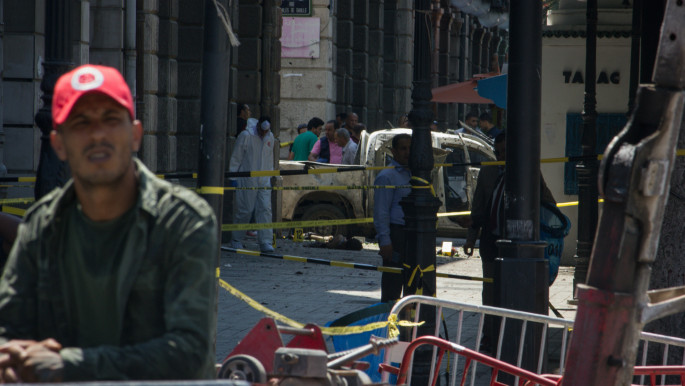How Islamic State is undermining Tunisia's impressive but fragile gains from the Arab Spring
Like the rest of the Arab world, however, Tunisia has struggled to deal with the spread of the Islamic State group (IS), whose followers threaten to undermine North Africa's one democracy.
If Tunisia hopes to secure its promising future, Tunisian authorities will have to prevent the militants from establishing a permanent headquarters in the country's remote, turbulent hinterland.
While IS has a much smaller foothold in Tunisia than in Libya or even Algeria, the militants have made their presence felt.
Just this June, IS launched twin suicide attacks in Tunis, killing a police officer. Tunisian authorities believe that 1,000 Tunisians who fought for IS in the Middle East returned to Tunisia between 2011 and 2018, offering IS cells in the country a large pool of battle-tested recruits.
In 2014, analysts estimated that as many as 3,000 Tunisians had gone to Iraq and Syria to participate in the conflicts there, making Tunisia a greater contributor of foreign fighters to IS than any other country. In light of IS's defeat in Iraq and Syria, many of those fighters want to come home.
 |
|
| Read also: Agonising choices: How post-Essebsi elections could cause further fragmentation for Tunisia's fragile democracy |
"Many Tunisians joined IS because of the allure of 'Islamic nationhood' that it offered," observed Dr Safwan Masri, a senior research scholar at the School of International and Public Affairs at Columbia University and author of Tunisia: An Arab Anomaly.
"So, it is not that Tunisians are particularly prone to Islamist terrorism; rather, it is precisely because of Tunisia's tradition of secularism and religious moderation that it held little appeal for many would-be ISIS fighters at the time."
In addition to returnees from Iraq and Syria, IS's affiliates in Tunisia can expect to solicit support from radicals who never left the country as well as the umbrella organisation's Libyan franchise.
In 2015, Seifeddine Rezgui – a Tunisian IS supporter who never visited Iraq or Syria – attacked a popular beach near the Tunisian city of Sousse, leading to 39 deaths. Only a year later, a Tunisian offshoot of IS ambushed a group of Tunisian soldiers near the Libyan frontier.
 |
Many Tunisians joined IS because of the allure of 'Islamic nationhood' that it offered |  |
Tunisia's underpowered security forces have often encountered difficulty policing the large, lawless border with their eastern neighbour.
"The porous frontier with neighbouring Libya, allowing for cross-border flows of weapons and terrorists, has exacerbated the IS threat and raised concerns that Libya's ongoing civil conflict could spill over and destabilise Tunisia's budding democracy," said Masri.
Despite IS's persistence, Tunisia has enjoyed several key successes against the militants. Earlier this year, Tunisian security forces eliminated a handful of IS cadres and foiled what Tunisian authorities described as "a terrorist operation planned for the month of Ramadan."
The United States, the leader of a global campaign against IS and one of Tunisia's closest allies, has played a decisive role in the country's response by patrolling Tunisia's Libyan border with drones, training Tunisian soldiers, and even using American commandos to assist Tunisian security forces' operations along the Algerian border.
"Tunisia has been in a state of emergency for nearly four years, and, despite restrictions on personal freedoms, this has allowed the state to crack down on extremist activity and to dismantle terrorist cells," Masri told The New Arab.
"Recent escalation in IS's rhetoric has further mobilised the state's security apparatus in its efforts to crush attempts by militants to secure a permanent foothold."
While Tunisia has an obvious interest in combating terrorism and ensuring Tunisians' security, another factor has fuelled Tunisian authorities' push against IS: tourism, a once-thriving industry in the country.
 |
|
| Read also: Terrorism strikes Tunisia again at a time of tourism recovery |
Tourism accounts for eight percent of Tunisia's gross domestic product and employs 800,000 Tunisians. The Sousse attack, whose victims included 30 British tourists, destroyed Tunisia's image as an idyllic North African tourist destination and hurt a critical sector of the country's economy as Tunisia was just beginning to recover from the financial aftershocks of the Arab Spring.
Tourism in Tunisia, like the country as a whole, is recovering thanks to the diligence of Tunisian diplomats, politicians, and security forces. In 2018, Tunisia's revenue from tourism grew 45 percent over the previous year's, and 8.3 million Algerians, Russians, and other tourists vacationed there, compared to seven million in 2017.
Though IS remains a threat to Tunisia, Tunisian authorities have made impressive progress against militants that have almost toppled young governments elsewhere.
"But more needs to be done," said Masri. "Otherwise, what you have is a socioeconomically fractured country ripe for potentially ruinous foreign and Islamist intervention. The real threat lies in that the lack of distributive justice and the challenging economic conditions, especially in the interior regions, make Tunisia vulnerable to threats, including to that of terrorism."
Austin Bodetti studies the intersection of Islam, culture, and politics in Africa and Asia. He has conducted fieldwork in Bosnia, Indonesia, Iraq, Myanmar, Nicaragua, Oman, South Sudan, Thailand, and Uganda. His research has appeared in The Daily Beast, USA Today, Vox, and Wired.



